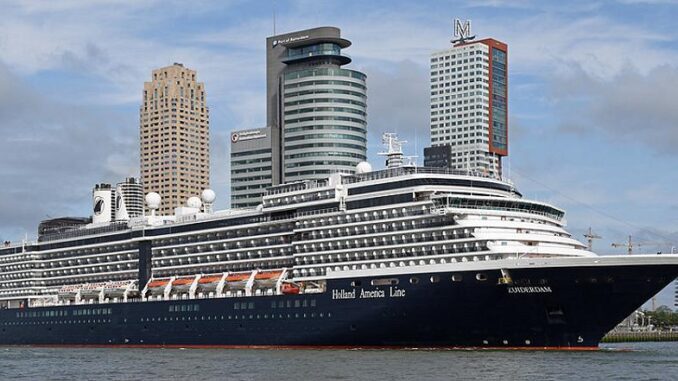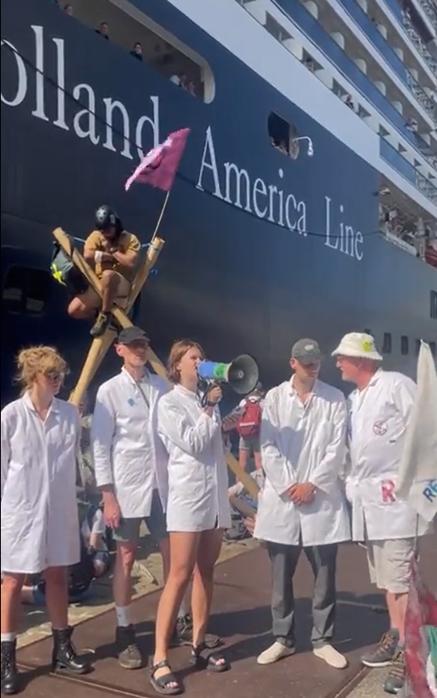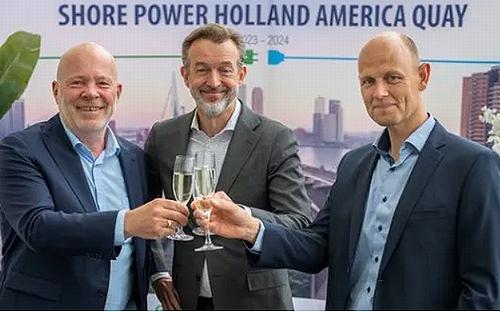
ROTTERDAM, The Netherlands, June 14, 2023 (ENS) – Activists with the nonprofit group Extinction Rebellion today blocked the departure of the Holland America Lines cruise ship “Zuiderdam” from the port of Rotterdam. The protesters detained the ship by closing off access to the mooring bollards, the tie-up points for mooring lines that anchor vessels safely at their docks.
Taking part in the demonstration were some 60 activists from Extinction Rebellion and its affiliate, Scientist Rebellion, an international movement of scientists and academics who are “extremely concerned about the climate and ecological crisis and who believe that civil disobedience by scientists can help press for urgent climate action.”

Using homemade tripods and human lockdowns, the activists entered the berth of the 286 meter-long “Zuiderdam” and obstructed its mooring bollards.
The demonstrators are seeking the end of all cruise ship calls to the Port of Rotterdam to reduce greenhouse gas emissions.
On June 11, as they were preparing for this action, Extinction Rebellion tweeted, “With a blockade, we are preventing the cruise ship Zuiderdam from leaving. We do this to draw attention to the disproportional climate and environmental damage cruise ships cause. We demand Rotterdam municipality and the harbour of Rotterdam ban all cruise ships from this city.”
The group maintains that discontinuing all cruise ship port calls is the only way to achieve zero climate-warming emissions.
The blockade was temporary and the “Zuiderdam” is now underway using its engines heading northward up the west coast of Norway.
Port of Rotterdam’s Solution: Shore Power
The direct action comes shortly after the port made some of the final arrangements for the shore power installation of Cruiseport Rotterdam.
On June 2, Peter Castberg Knudsen, partner of PowerCon, and Mai Elmar, director of Cruiseport Rotterdam and Cruiseport Shore Power, signed the agreement designating Danish PowerCon A/S as the company that will install shore power for the Cruiseport.
Cruiseport Shore Power, CSP, is a subsidiary of the Port of Rotterdam Authority. It was set up specifically for the construction and operation of shore power. The Port Authority is responsible for the project management of the construction on behalf of CSP.
The use of shore power reduces the most abundant greenhouse gas carbon dioxide (CO2), as well as emissions of nitrogen and particulate matter. In addition, the sound of cruise ships at the quay decreases with the use of shore power.

With the commissioning of shore power, Cruiseport Rotterdam is ahead of European regulations, which mandate that by 2030 all cruise ships in European ports must use shore power.
The signing took place in the presence of Robert Simons, port alderman of Rotterdam, and Boudewijn Siemons, chief operating officer of the Port of Rotterdam Authority.
The costs of the construction of Cruiseport Rotterdam and Cruiseport Shore Power are estimated at 15 million euros. The Port Authority and the municipality, in collaboration with the national Ministry of Infrastructure and Water Management, have made the financing possible.
This year, 124 cruise ships are expected to arrive at Cruiseport Rotterdam. The Port Authority expects that in 2025 more than 75 percent of cruise ships in Rotterdam will use shore power.
Russian Hackers Target Dutch Ports’ Websites
Pro-Russian hackers have targeted several Dutch ports’ websites with cyber attacks in the past week, the “Netherlands Times” reports. The DDoS attacks have knocked several ports’ websites offline for several hours or even days.
NoName057(16) claimed responsibility for the attacks in response to the Netherlands’ intention to buy Swiss tanks for Ukraine, RTL Nieuws reports.
The port authorities of Groningen, Amsterdam, Rotterdam, and Den Helder confirmed the DDoS attacks to the broadcaster.
The websites of the port authorities in Rotterdam, Amsterdam, and Den Helder were offline for several hours last week Tuesday. And the Groningen Seaport website was offline throughout the past weekend.
The Port of Rotterdam Authority told reporters the attacks were carried out from Russian and Serbian IP addresses. They took down the website for less than a day. “For us, the website is important because we can inform the public, but we are not dependent on the website,” the Port Authority spokesperson said. “Systems for handling shipping were never in danger – they run on other servers.”
Featured image: The Holland America Lines cruise ship “Zuiderdam” leaves the Port of Rotterdam, the Netherlands, July 13, 2019 (Photo by Huib Smit)
© 2023, Environment News Service. All rights reserved. Content may be quoted only with proper attribution and a direct link to the original article. Full reproduction is prohibited.



